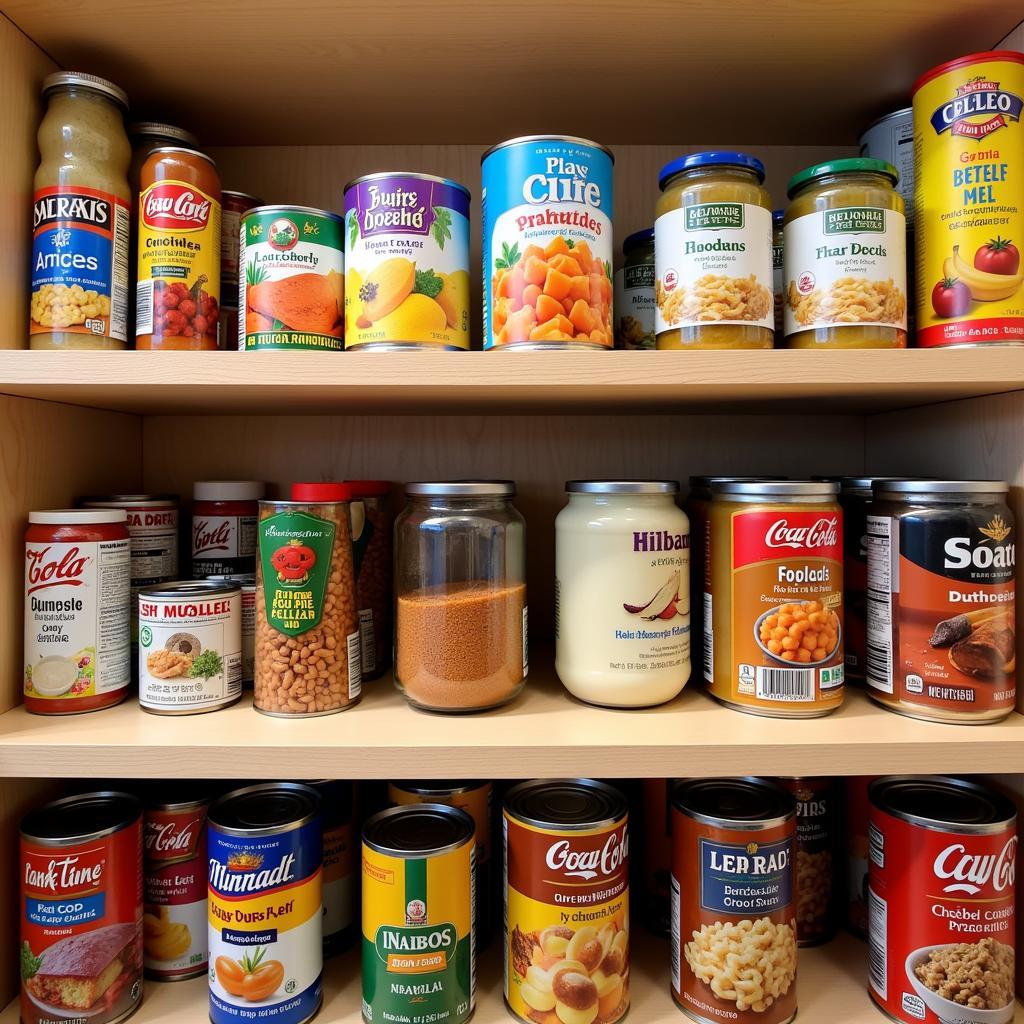Metal Can Food Storage is a cornerstone of modern food preservation, offering a long shelf life and convenient way to keep a variety of foods safe for extended periods. But why are metal cans so effective, and what do you need to know to make the most of this storage method? Let’s delve into the world of metal can food storage, exploring its benefits, potential drawbacks, and best practices for optimal results.
The Science Behind Metal Can Food Storage
The secret to metal can food storage’s success lies in its ability to create a hermetically sealed environment. This means the can is airtight, preventing the entry of air, moisture, and microorganisms that cause spoilage. This is achieved through a meticulous process:
- Food Preparation: Food is cleaned, processed, and often cooked to eliminate harmful bacteria.
- Can Filling: The prepared food is sealed inside a sterilized metal can.
- Air Removal: Air is removed from the can to create a vacuum, inhibiting the growth of oxygen-dependent bacteria.
- Sealing: The can is hermetically sealed, ensuring no contaminants can enter.
- Heating: The sealed cans undergo a heating process to destroy any remaining microorganisms. This process is known as sterilization or pasteurization, depending on the temperature and duration.
This combination of steps ensures that food inside metal cans remains safe and edible for extended periods, often ranging from one to five years, and in some cases, even longer.
Advantages of Metal Can Food Storage
 Pantry Stocked with Canned Goods
Pantry Stocked with Canned Goods
Metal can food storage offers numerous benefits:
- Long Shelf Life: The hermetic seal and preservation techniques significantly extend the shelf life of food, reducing waste and saving money.
- Convenience: Canned foods are readily available, require minimal preparation, and are easily portable, making them ideal for emergencies, camping trips, or quick meals.
- Nutrient Retention: The canning process helps preserve essential vitamins and minerals, often making canned fruits and vegetables nutritionally comparable to fresh produce.
- Durability: Metal cans are resistant to damage, pests, and extreme temperatures, making them suitable for a wide range of storage conditions.
- Food Safety: The canning process eliminates the risk of harmful bacteria, ensuring the safety of the food inside.
Considerations for Metal Can Food Storage
While metal can food storage offers significant advantages, there are a few considerations:
- BPA Concerns: Bisphenol A (BPA), a chemical used in some can linings, has raised health concerns. Look for BPA-free cans or choose alternatives like glass jars when possible.
- Taste and Texture: The canning process can sometimes alter the taste and texture of food, particularly in comparison to fresh alternatives. However, advancements in canning techniques have minimized these differences.
- Storage Conditions: While metal cans are durable, storing them in a cool, dry place away from direct sunlight and heat sources helps maintain optimal food quality.
Choosing and Using Canned Foods
Here are some tips for selecting and using canned foods:
- Check for Damage: Inspect cans for dents, rust, or bulging, which could indicate spoilage.
- Read Labels Carefully: Pay attention to expiration dates, ingredients, and nutritional information.
- Rinse Before Use: It’s a good practice to rinse canned fruits and vegetables before consumption to remove excess salt or syrup.
- Get Creative with Recipes: Canned foods are incredibly versatile. Use them in soups, stews, salads, pasta dishes, or as a base for dips and spreads.
Metal Can Food Storage: A Reliable Preservation Method
Metal can food storage remains a reliable and efficient method for preserving a wide range of foods, offering convenience, extended shelf life, and nutritional value. By understanding the process, benefits, and best practices, you can confidently incorporate canned foods into your pantry staples, ensuring you have access to safe, nutritious meals whenever you need them.
FAQs About Metal Can Food Storage
1. How long can you store food in metal cans?
The shelf life of canned goods varies depending on the type of food but generally ranges from one to five years, and sometimes even longer if stored properly.
2. Can you freeze food in metal cans?
It’s not recommended to freeze food in metal cans. Freezing can cause expansion, potentially damaging the can and compromising the seal.
3. Are there any health risks associated with metal can food storage?
While generally safe, be mindful of BPA in can linings. Choose BPA-free options when available.
4. What are some common signs of spoiled canned food?
Bulging cans, rust, dents, leaks, foul odors upon opening, and spurting liquid are all signs of spoilage. Discard such cans immediately.
5. How can I incorporate more canned foods into my diet healthily?
Choose low-sodium and no-sugar-added options when available. Rinse canned fruits and vegetables to remove excess salt or syrup. Explore recipes that utilize canned foods in creative and nutritious ways.
Need More Information?
For further insights on food storage solutions, explore our articles on food carry trays, food service pans, small batch dog food recall, chinese food takeout boxes, and healthy baby food pouches.
Remember, safe and effective food storage is crucial. Contact our team at 02437655121, email us at minacones@gmail.com, or visit our location at 3PGH+8R9, ĐT70A, thôn Trung, Bắc Từ Liêm, Hà Nội, Việt Nam, for any questions or assistance. Our dedicated customer support team is available 24/7 to assist you!